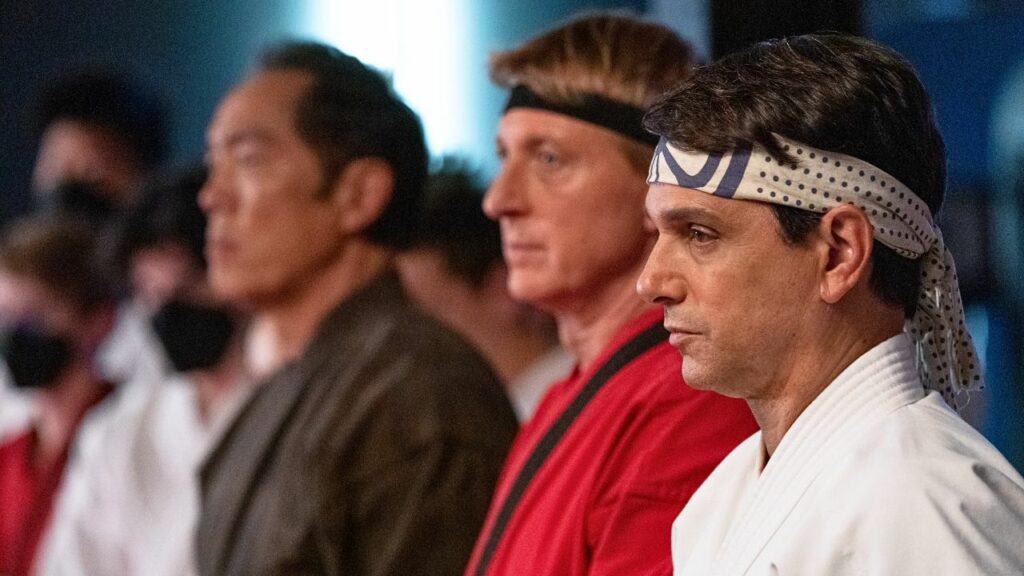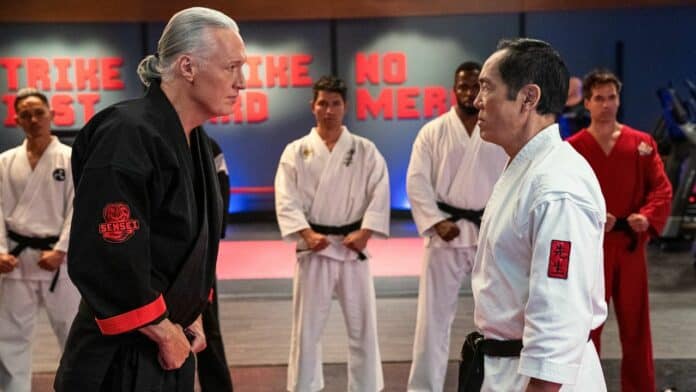Cobra Kai is a martial arts dramedy series that revolves around different dojos and their distinct philosophies.
Cobra Kai, the popular television series, has rekindled interest in martial arts through its portrayal of the eponymous dojo and its rival, Miyagi-Do.
This article explores how the martial arts philosophy depicted in Cobra Kai compares to the principles practiced in real-life dojos.
The Philosophy of Cobra Kai
In Cobra Kai, the dojo’s philosophy is encapsulated in its motto: “Strike First, Strike Hard, No Mercy.”
This approach, primarily advocated by Johnny Lawrence, emphasizes aggression, dominance, and the importance of winning at all costs.
It’s a stark contrast to traditional martial arts tenets, which often focus on self-defense, discipline, and personal growth.
Miyagi-Do: A Contrasting Approach
Miyagi-Do, the dojo inspired by Mr. Miyagi from the Karate Kid films, presents a contrasting philosophy in Cobra Kai.
It advocates for balance, peace, and using martial arts as a way of life rather than just a means to win fights.
This approach is more in line with the philosophies of many real-world martial arts schools.

Real Dojos: Discipline and Respect
In actual dojos, the focus is often on discipline, respect, self-control, and the development of character.
While self-defense and physical prowess are essential components, they are usually seen as part of a broader educational process.
This is somewhat reflected in Miyagi-Do’s philosophy but is in direct contrast to the aggressive stance of Cobra Kai.
The Role of Competition
Competition is a common element in both Cobra Kai and real dojos, but the approach differs.
In Cobra Kai, competition often takes center stage, with a significant emphasis on winning.
In contrast, many real-life dojos use competition as a means of testing skills and personal development, rather than as an end in itself.
The Impact of Leadership
The leadership styles of the instructors in Cobra Kai significantly influence their dojo’s philosophy.
This is also true in real-life martial arts schools, where the instructor’s beliefs and values shape the training environment and the lessons imparted to students.
Adaptation and Evolution
Both Cobra Kai and real dojos show an ability to adapt and evolve.
In Cobra Kai, characters like Johnny Lawrence begin to question and modify their approach to martial arts as the series progresses.
Similarly, real-world martial arts have evolved over time, incorporating new techniques and philosophies while maintaining core principles.
Conclusion
Cobra Kai provides an entertaining and dramatized depiction of martial arts philosophy, contrasting the aggressive stance of Cobra Kai with the more traditional, balanced approach of Miyagi-Do.
While some elements reflect real-world martial arts teachings, Cobra Kai primarily serves as a narrative device to explore broader themes of conflict, growth, and redemption.
Real-life dojos, on the other hand, tend to emphasize discipline, respect, and personal development, offering a more holistic approach to martial arts training.
Also Read: The use of symbolism in Stranger Things

